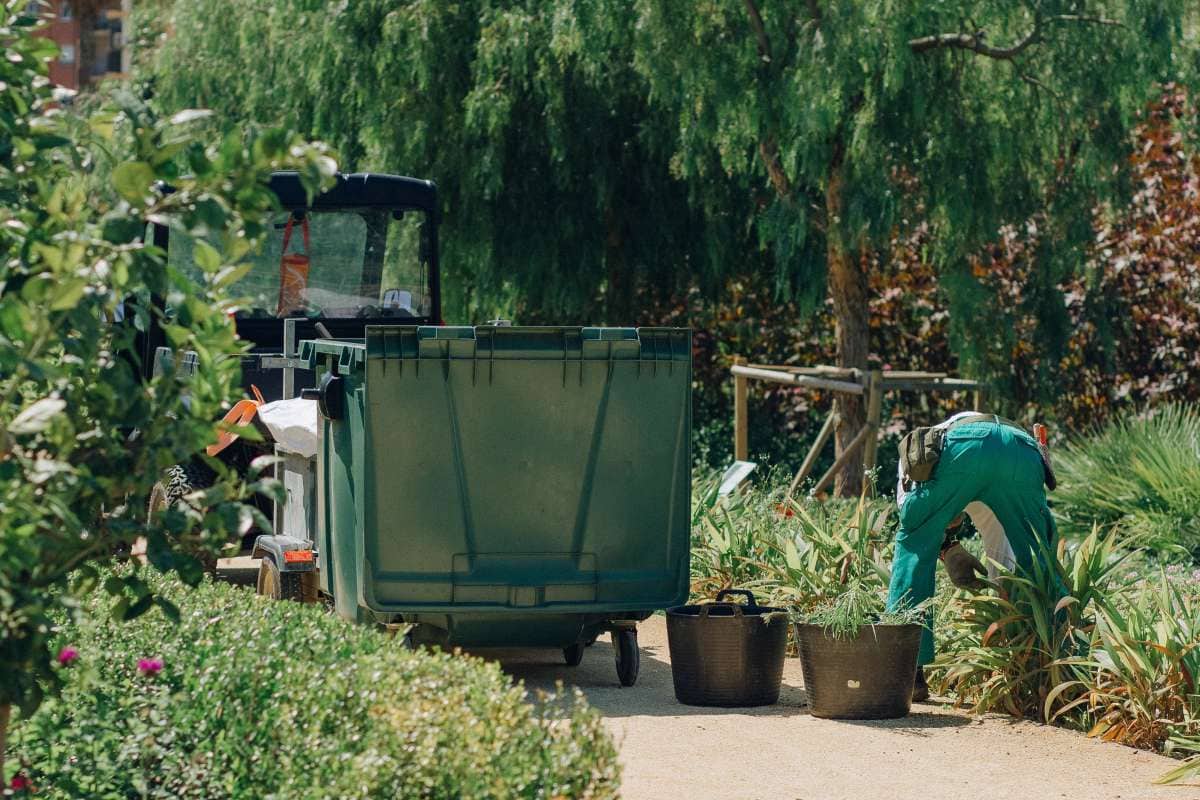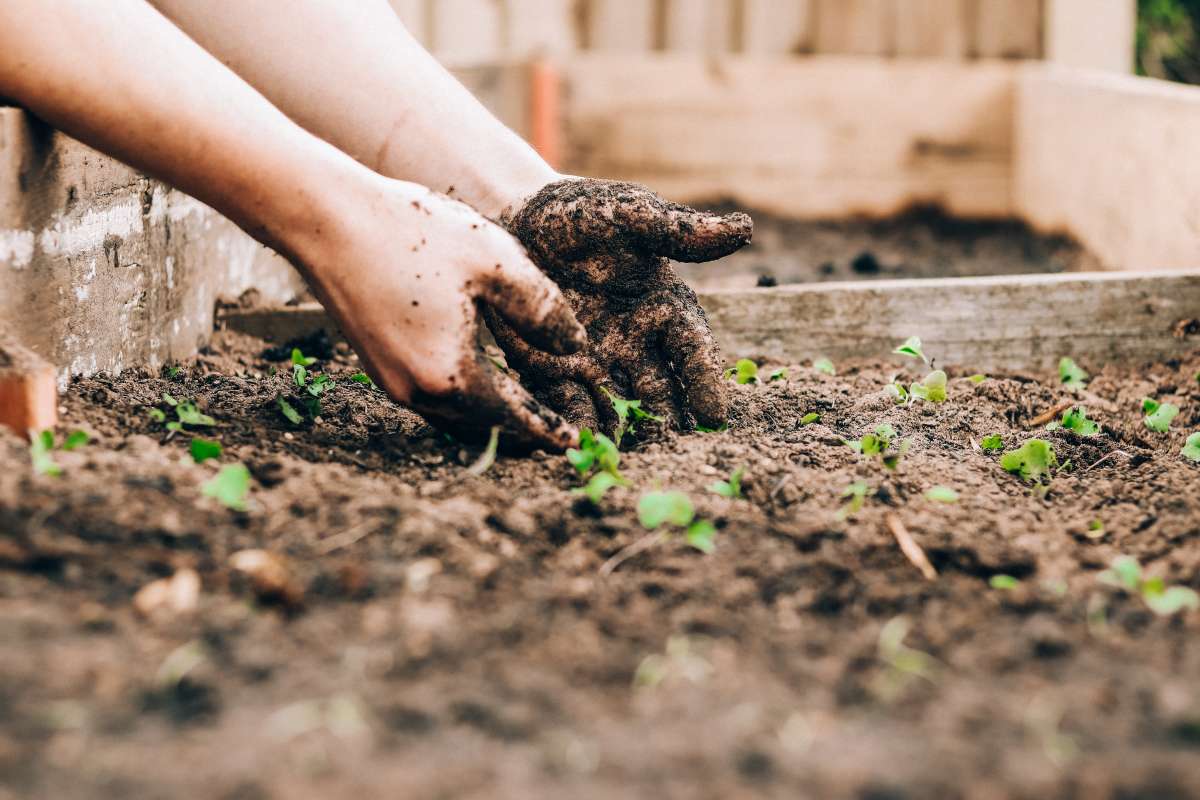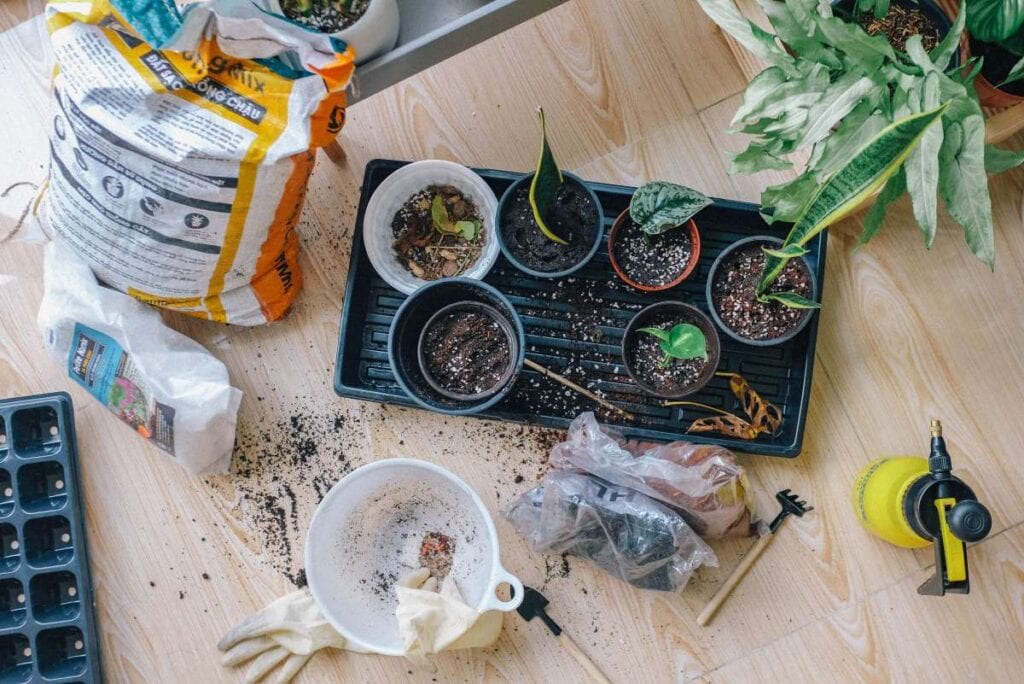While tending a garden can be very rewarding, there is a downside: the waste it creates. Branches, clippings, weeds, soil, stones, and even plants can all be considered garden trash. It's important to properly dispose of garden waste to prevent pollution and preserve natural resources.
Thankfully, there are a variety of solutions to the problem of garden waste disposal, such as kerbside bins, wood chipper rentals, and DIY compost piles. Some efficient and environmentally friendly strategies for dealing with yard waste are discussed here, along with the benefits and drawbacks of each strategy.
Types Of Garden Waste

Grass Cuttings & Leaves
Most yard trash is generated when you trim your grass or prune your bushes and trees. What can you do with all of these bags full of random trimmings?
Surprisingly, grass clippings can be reused on the lawn as a natural fertiliser to promote even greener and healthier grass growth. By using the trimmings as mulch around your plants, you can recycle both the leaves and the mulch.
Fruit & Veg
Fruits and vegetables can be obtained as garden waste, typically when they fall from trees. It's possible that a lot of the fruit and vegetables in your garden look spoiled. When trash begins to pile up, it can be difficult to determine how to proceed.
Thankfully, it can serve a second purpose as compost. Tossing unwanted produce into a compost pile is an ingenious way to create your own organic fertiliser, which can be used all over the garden.
Twigs & Branches
Sticks and branches can accumulate in your yard if you've been trimming trees or if branches have broken off as a result of severe weather. Anyone can trip over them, and some of them may have sharp edges.
In this case, clearing your garden of debris is your best bet. Since you won't be using them for anything else, it's best to hire a garden clearance service to get rid of them quickly and efficiently.
Miscellaneous Objects
Finally, garden trash comes in a wide variety of objects. Old plant containers, broken seed trays, garden furniture, worn-out swings, and so on are all examples. Anything that has been sitting in your garden for years or has recently broken, including shards of glass from a defunct glasshouse, fits into this category.
How To Handle Garden Waste
Most things that accumulate in a garden are probably biodegradable and organic. However, not all forms of organic waste will be collected by your garbage service. Do not put yard debris, such as leftover peels from fruits and vegetables, in recycling bins.
In addition, it can be challenging to deal with green wastes like large branches and decaying trees. Branches with a diameter greater than 100 mm should not be placed in your trash cans.
When deciding how to get rid of your yard debris, there are several factors to think about. Here are some suggestions for dealing with the mountainous waste that has accumulated in your outdoor spaces:
Sort It Out
The most efficient method of handling garden waste is to divide it into recyclable and non-recyclable components. Green waste should be kept to a minimum, and branches should be no more than 100 mm in diameter.
Furthermore, there are weight limitations on the disposal of green waste. Trash can overflow from bins or be too bulky to fit inside when dealing with piles of leaves and other garden waste. If that occurs, you'll need to come up with some other ingenious solution to the problem of garden garbage.
Choose a trustworthy Sydney house cleaning service to conduct regular home cleanings as another preventative measure. In this way, you can prevent garbage from piling up and maintain a pristine home environment.
Composting Organic Wastes
Composting is the best next step after collecting yard waste, such as dead leaves and grass clippings. The best method of garden maintenance is composting, which can be done by mixing garden waste with kitchen scraps.
Leaves, weeds, and spent flowers are all acceptable additions. Just make sure your pile has adequate moisture and ventilation. Over time, your garbage decomposes into mulch, which you can use to improve the soil in your garden.
Proper Lawn Care
Another great solution to your garden waste problem is to simply produce less garbage. It makes sense that lawn would account for a large portion of your garden's trash if it took up most of your gardening space. So, it makes sense to focus on your lawn space in order to lessen trash accumulation.
Finding grass species that are suited to your garden's conditions is an important part of lawn maintenance. In addition, only cut about a third of the grass at a time to lessen the volume of grass clippings you'll have to haul away.
Practice Grasscycling
The term "grasscycling" is relatively unknown. Grasscycling is a method of lawn maintenance that involves reusing and composting grass trimmings. Leaving the cuttings on the ground will result in mulch, which is great for the garden because it retains moisture and provides nutrients.
Try Vermicomposting
Another efficient approach to composting is vermicomposting. Using worms speeds up the process of making mulch. This method is useful when you don't have a lot of room for composting and can only use small containers.
Vermicomposting is helpful for people because they produce so much food waste. Mulch made from a mix of green waste, kitchen scraps, and shredded paper can be produced more quickly, which is good news for your pants.
Donate Garden Waste
Some businesses will take your organic yard waste if you can't use the first set of techniques mentioned. If you properly dispose of your yard waste as per the regulations, however, these services will gladly pick it up from you.
Reuse Some Waste
Reusing some of your yard waste is a great way to help the environment and cut down on trash. Some branches and trimmings can be used to start a fire in a grill or wood stove. Solid waste, such as ornaments and metals, can also be used to design an urban garden or as yard decor.
Hire Skip Bins
It's likely that the local bins provided by the municipality will be too small to accommodate your garden waste. The problem with your garden can be solved by hiring a private company or a company that rents out skip bins.
Ways To Manage Garden Waste

Experiencing or being around plants or other natural elements has been shown to reduce stress. This is why cultivating a home garden full of ornamental plants like shrubs and small trees is a good idea. Plants that produce edible fruits and vegetables can be grown in the comfort of one's own backyard.
Gardens, however, are also one of the largest contributors to trash in any area. You could install your own garden waste management system to help the city with its waste management needs. At least three suggestions are offered here for your consideration.
Composting
The appearance of your garden depends on how often the plants in it are trimmed. Weeds are a nuisance, and they can steal water and nutrients from your plants if you don't get rid of them. There is a lot of organic garbage produced as a result of these routine upkeep procedures. Fortunately, this type of garbage can be recycled effectively into compost.
It is possible to build your own composting facility with the help of numerous online guides. One other option is to take the trash to a recycling centre. A local dumpster company may come in handy if your garden is particularly large and produces a lot of organic waste that needs to be removed.
Burning
Organic garbage that has been dried out can be burned for disposal. Makeshift incinerators are easy to construct, and the ashes can be recycled into compost. If larger branches have broken off and left behind twigs and chips, you can be a little more resourceful. For a backyard barbeque with friends and family, for instance, they make a great fuel source.
You should exercise caution with this approach because some neighbourhoods may have policies in place that strictly forbid backyard burning. Carbon dioxide is released during combustion, which can significantly impact ambient air quality. Therefore, it is reasonable to expect local governments to implement safety measures.
Even if there are no local prohibitions against it, burning is only possible during certain times of the year. Since organic waste doesn't dry quickly, burning could be difficult during the wetter months.
Rely On Your Community's Garbage Collection System
You might not have the room or time for composting. However, there are risks involved with burning organic waste that you may not be prepared to handle. As a result, you'll have to rely on the garbage collection services offered by your neighbourhood.
You'll need to correctly sort your trash and have it ready for collection when it's time. To avoid having trash sit around for an extended period of time after collection, you may want to rearrange your trimming and cleaning schedule accordingly.
Gardens reduce stress by encouraging contact with natural surroundings. They can also be used as a regular form of physical activity. However, there is an expense associated with maintaining a garden. Your garden's complexity and size are entirely dependent on your willingness to put in the work required to manage its waste.
Why Recycle Garden Waste?
Kerbside garden waste is transported to a composting facility, where it is transformed into a beneficial soil conditioner that enhances a soil's nutrient content and structural integrity, thereby promoting plant growth. After that, it can be used in the garden, on the farm, or as an ingredient in a multipurpose compost from the local garden centre.
How Is Garden Waste Recycled?
When yard waste is delivered to a composting site, non-compostable items are separated out, and the rest is shredded before being stacked in a long pile outside.
Composting sites are like backyard compost bins, except they are actively managed to hasten the process. A normal home compost bin wouldn't reach these temperatures because of the lack of material. It can get as hot as 60 degrees Celsius. Composting can be completed in a matter of weeks when the temperatures are high enough to put the enzymes and bacteria to work quickly.
Microorganisms aid in the decomposition process by oxygenating the material, so it is turned frequently. Extreme heat eliminates pests, unwanted plants, and diseases.
Screening the compost is the last step in the process because it allows for the final contamination to be removed and the material to be graded for different applications. If some of the compost hasn't broken down or is still too big, it can be recycled through the system again.
The total time involved ranges from eight to sixteen weeks, depending on the intended use of the finished compost.
FAQs About Garden Rubbish Removal
The most sustainable method for dealing with garden waste is to turn it into a compost heap. This method is not only eco-friendly but also provides a nutrient-rich soil amendment that can be used in the garden.
Effective waste management and garden rubbish removal start with proper identification and sorting of your waste. Identify your waste and sort it properly. The following are examples of garden and organic rubbish: stumps, logs, lopped or fallen branches, green waste (grass, leaves, and small twigs), and mixed general waste (plastic and paper bags from gardening stores, lawn furniture, bricks, plant pots, soil, and hand branches).
Garden waste can be removed in several ways, including composting, incineration, skip bins, and waste removal companies. Incinerators and bonfires are quick and effective ways to get rid of garden waste, but make sure they do not cause problems for your neighbors. Waste removal companies offer services such as on-site pickups and outdoor pickups. Skip bins are also available for garden projects of different sizes, and the waste management company can recycle the green waste into compost for other gardeners to use.
The cost of garden waste removal can vary depending on the method you choose and the amount of waste you have. The cost can also vary by location and the waste management company you choose.
Waste removal companies charge on the basis of volume, so our advice is to try to reduce the space your waste takes up as much as possible by cutting up bulky items like branches and placing heavier items on top to push them down. This can help reduce the volume of your waste and, consequently, the cost of removal.
Conclusion
Proper disposal of garden waste is crucial for the protection of the environment and the conservation of natural resources. Kerbside bins, rented wood chippers, and do-it-yourself compost piles are just a few of the options available to deal with this issue. Grass clippings, leaves, fruit and vegetable scraps, twigs and branches, and random things are all examples of garden garbage.
A garden clearance service can swiftly and efficiently remove grass clippings, leaves, fruit and vegetable scraps, twigs and branches, and other random debris from your property. Garbage services may or may not pick up garden waste despite its biodegradability and organic nature.
Choose a reliable Sydney house cleaning agency to deal with this, and separate it into recyclable and non-recyclable components yourself. Proper grass maintenance can aid in reducing garbage collection, and composting garden waste with kitchen scraps is a viable option. The methods for dealing with garden trash are the focus of this article. Grasscycling is a technique for lawn care that involves reusing and composting grass trimmings; vermicomposting is an effective method of composting; businesses will accept donations of garden waste; recycling some yard waste is a fantastic way to help the environment; and renting a skip bin is a great way to alleviate stress. It's also a good idea to grow a garden full of decorative plants at home.
When properly implemented, a yard waste management system can alleviate the city's waste management woes. To lessen the volume of garden organic waste, composting is an excellent option. Creating a composting facility or visiting a recycling centre are both viable options. Makeshift incinerators can be used to burn organic waste, although this is only practicable at specific periods of the year. It's crucial to modify your pruning and cleaning routine so that waste doesn't pile up for too long following collection.
While gardening's stress-relieving benefits—including increased physical activity and connection to nature—are undeniable, the hobby does not come cheap. To create a soil conditioner used in the garden, on the farm, or as a component in a multipurpose compost, garden waste is hauled away and processed at a composting facility. Microorganisms contribute in the decomposition process by oxygenating the waste, and composting sites can achieve temperatures of up to 60 degrees Celsius. The next step, screening the compost, might take anywhere from eight to sixteen weeks.
Content Summary
- Garden waste can be a downside to tending a garden.
- Proper disposal of garden waste prevents pollution and preserves natural resources.
- Solutions for garden waste disposal include kerbside bins, wood chipper rentals, and DIY compost piles.
- Grass clippings can be reused as a natural fertiliser for the lawn.
- Fruit and vegetables can be composted to create organic fertiliser.
- Clearing twigs and branches from the garden is best done through a garden clearance service.
- Miscellaneous objects like old plant containers and garden furniture fall under garden trash.
- Sorting garden waste into recyclable and non-recyclable components is efficient.
- Composting garden waste with kitchen scraps is a beneficial method of disposal.
- Proper lawn care can reduce the volume of garden waste.
- Grasscycling involves leaving grass trimmings on the ground as mulch.
- Vermicomposting with worms can accelerate the composting process.
- Donating garden waste to businesses that accept it is an option.
- Reusing yard waste for fires or as yard decor helps reduce trash.
- Hiring skip bins can accommodate large amounts of garden waste.
- Garden waste management contributes to stress reduction and a cleaner environment.
- Weeds can be recycled into compost through composting.
- Burning dried organic waste can be a disposal method, but caution is necessary.
- Reliance on the community's garbage collection system is an alternative for waste disposal.
- Recycling garden waste enhances soil nutrient content and promotes plant growth.
- Kerbside garden waste is transported to composting facilities.
- Composting sites actively manage the decomposition process to expedite it.
- Microorganisms and high temperatures aid in the composting process.
- Screening compost removes contaminants and grades the material for different uses.
- The composting process takes around eight to sixteen weeks.
- Garden waste can be transformed into a beneficial soil conditioner.
- Compost can be used in gardens, farms, or as an ingredient in multipurpose compost.
- Garden waste should not be placed in recycling bins.
- Green waste disposal may have weight limitations.
- Regular home cleanings can help prevent waste buildup and maintain a clean environment.


